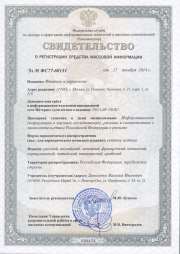MAIN PAGE
> Journal "Finance and Management"
> Contents of Issue є 03/2016
Contents of Issue є 03/2016
|
Pastukhanov A. - Managing Risks at Banks Partially Owned by the Government
|
|
pp. 98-113
|
DOI: 10.7256/2409-7802.2016.3.20019
Abstract: The subject of the research is the key elements in the system of risk management at systemically important banks partially owned by the government. Due to observed changes in the banking sector, there is a certain need to review the system of risk management in these banks. In the course of the research Pastukhanov analyzes the main indicators of banks' financial stability and describes negative tendencies in banking activities taking into account their transfer to a new international standard The Third Basel Accord. Results demonstrate the fall in banks' profitability and raise in the value of funding sources. To define possible causes of such dynamics, the author of the article analyzes the main elements of the risk management system at banks. By using methods of structural-logical and comparative analysis, the author evaluates the ability of the system to resonse to challenges. In his research Pastukhanov general research methods such as analysis, synthesis, induction, deduction, abstraction, formalization, classification, structural-logical and comparative analysis. Results of the resaerch prove the hypothesis that it will be reasonable to review the system of risk management at banks partially owned by the government in order to minimize losses during the transfer to international standards and raising of business profitability. The outcome of the research is the conclusion about the need to integrate the system of risk management in the strategic decision making process made by banks partially owned by the government as well as to implement non-financial risk management.

|
Shiryaeva G. - Difficulties of Leasing
|
|
pp. 114-121
|
DOI: 10.7256/2409-7802.2016.3.20512
Abstract: The subject of the research is the issues arising in the process of leading deals under the conditions of Russia's economy. The purpose of each leasing deal is to provide an effective assessment of all possible risks and to find methods that guarantee their complete or partial prevention. In her research Shiryaeva defines a number of difficulties parties of a leasing deal may face. The author conducts an evaluation of all possible risks related to document distribution, pricing, accounting and tax accounting, anaylsis and evaluation of a financial status of a lessee and lessor. The author also offers ways to minimize or completely prevent these risks. The methodological basis of the research involves a set of general and special research methods such as analysis, synthesis, systematization, generalization, argumentation and other formal logical methods. The results of the research expand our knowledge about risk managing as an instrument to be used as part of a strategic development and increasing efficiency of lessor's and lessee's activities. At the same time, integrated and successive poilcy in all aspects of a leasing deal increases efficiency of leasing as an instrument of business financing and allows to use all potential of leasing. Conclusions made by the author of the article may be useful to researchers, professors, post-graduate students, practical experts in the sphere of leasing relations as well as everyone who may be concerned about the topic of the research.

|
Litvinov E.O. - The Loan Debt Burden of Russia's Population in Terms of the Crisis
|
|
pp. 122-131
|
DOI: 10.7256/2409-7802.2016.3.20529
Abstract: The subject of the research is the processes of creation and quantitative evaluation of individual loanee's credit burden as an important indicator of effective functioning of the country's credit banking system and, at the same time, indicator of recessionary tendencies in its development. Global financial crisis, especially in Russia due to the adverse impact of various geopolitical factors, occlusion of external financial sources of the credit activity of Russian commercial banks, decline in income, growth of unemployment and inflation have brought the problem of evaluating the credit burden of the country's population to the fore. The present research is aimed at creating a detailed system of indicators to evaluate the loan debt burden, analysis of scales and dynamics of the credit burden, coming to verifiable conclusions about its development tendencies in Russia, and elimination of negative tendencies in the development of the value of the credit burden at the present stage. The research was carried out using such methods of research as analysis and synthesis, deduction and induction as well as systems', structural, functional, factor, and economic-statistical analysis. The author clarifies the term 'loanee's credit burden' and emphasizes the need to conduct a quantitative evaluation of the loan debt burden as well as offers different approaches to conducting such evaluation. The author also performs the quantitative evaluation of Russian population credit burden over the period of time since 1998 till 2016 and analyzes different scenarios for eliminating gaps and contradictions caused by the development of the population credit burden at the present time. The quantitative evaluation of the credit burden allows to make reasonable conclusions about the dynamics, vector and development tendencies of retail lending, forecasting and prevention of its negative influence on the credit banking system as well as to define the best credit burden which would satisfy interests of all participants of credit relations.

|
Investments and investing |
|
Nikitin V. - Subsidiaries of International Construction Companies in the Russian Federation
|
|
pp. 132-143
|
DOI: 10.7256/2409-7802.2016.3.20250
Abstract: The article is devoted to analyzing legal problems arising in the process of launching international construction companies on the Russian construction market. The author examines the most common method of running business in the Russian Federation through creating a subsidiary business entity, advantages and disadvantages of such method compared to establishing affiliate or representational offices of an international construction company. In his research Nikitin focuses on the most recent amendments to the legislation in the sphere of foreign investments, actual judicial practice as well as the government executive authorities' views on the matter. The methodology of the research involves methods that are typical for entrepreneurial law and implies combination of the civil approach and analysis of an object in cooperation with public order institutions. The scientific novelty of the research is caused by the fact that the author raise a problem about business reputation of subsidiaries of international construction companies. The solution offered by the author implies the legal mechanism of plain partnership within which a consortium of the parent international construction organisation and their branch organisation is established to combine material and non-material resources.

|
Economic control and management |
|
Izmailov A.M., Ashmarina S.I., Kandrashina E.A. - Peculiarities of Managing Changes in the Socio-Economic Systems Taking into Account Structural Changes of Entrepreneurial Development
|
|
pp. 144-151
|
DOI: 10.7256/2409-7802.2016.3.20506
Abstract: In this article the authors analyze the nature of socio-economic systems, their structure and peculiarities of interaction between structural elements. The authors analyze the concept of 'information knowledge environment' and its role in the development of socio-economic systems. They view business entities from the point of view of socio-economic systems and emphasize the importance of the information knowledge environment in the development of socio-economic systems. The authors also analyze the term 'managing changes' and peculiarities of this process under the conditions of the development of socio-economic systems. They analyze peculiarities of managing changes in the socio-economic systems taking into account structural changes in the sphere of entrepreneurial development. In the course of their research the authors use the method of ascent from the abstract to the concrete which implies a conventional dismembering of a research object and description of its features using numerous terms and characteristics. The main conclusion of the research is the model of socio-economic systems representing interaction between structural elements in terms of a single systems' approach. The result of the research is the systematization of peculiarities of managing changes in the socio-economic systems such as: complex structure of socio-economic systems, integrity of socio-economic systems, elements with different goals, tasks and development vectors in the structure of socio-economic systems, division of the space into two parts, socio-economic systems and environment, and intensive interaction of the socio-economic systems with the environment.

|
Izmailov A.M., Ashmarina S.I., Kandrashina E.A. - The Model for Managing Changes in Business Entities as Socio-Economic Systems
|
|
pp. 152-162
|
DOI: 10.7256/2409-7802.2016.3.20511
Abstract: In this article the authors analyze the nature of socio-economic systems (SES) including business entities and peculiarities of interaction between their structural elements. The authors analyze the concept of 'information knowledge environment' and its role in the development of socio-economic systems. They emphasize the importance of the information knowledge environment in the development of socio-economic systems. The authors also analyze the term 'managing changes' and peculiarities of this process under the conditions of the development of socio-economic systems. The authors offer their own mode for managing changes in the socio-economic systems and define positive and negative sides of the evolutionary and revolutionary approaches to managing changes in the SESs. The authors describe peculiarities of managing changes in the SESs. In the course of their research the authors use the method of ascent from the abstract to the concrete which implies a conventional dismembering of a research object and description of its features using numerous terms and characteristics. The main contribution made by the authors to the topic is, first of all, the fact that they have developed their own model for managing changes in business entities as socio-economic systems. The authors define positive and negative aspects of the evolutionary and revolutionary approaches to managing changes in the socio-economic systems and describe peculiarities of managing changes in the socio-economic systems.

|
Shakirova R.K. - Institutional Environment of Regional Industry Clustering
|
|
pp. 163-175
|
DOI: 10.7256/2409-7802.2016.3.19973
Abstract: The object of the research is the process of formation of regional industry clusters, the subject of the research is the institutional environment that affect the formation and development of clusters in the regions. The author of the article considers theoretical aspects of topics related to the concept of "institution" and "institutional environment". In particular, she outlines the main qualifying features of the concept "institution", methods of classification of institutions, highlights the basic elements of the institutional environment of regional cluster development. Special attention is paid to the algorithm used to analyze the institutional environment of regional clustering. The main research method involves a set of abstract-logical methods (induction and deduction, analysis and synthesis, analogy and comparison, formalisation and modelling). The main conclusion of the research is that for the initial stage of studying the institutional environment of the cluster it is better to divide institutions into different groups depending on their level of formalization and level of control. The scientific novelty of the research is caused by the fact that the author defines elements of the institutional environment for cluster development of the regions, and also develops the algorithm for this kind of analysis.

|
Innovations, innovative activities |
|
Parfenova M.V. - Development of Measures Aimed at Increasing Efficiency of a Corporate Innovation Policy (the Case Study of OOO 'AgroPromServis'
|
|
pp. 176-180
|
DOI: 10.7256/2409-7802.2016.3.20413
Abstract: As a result of an established innovation policy that acts as a catalyzer of the financial economic activities, OOO 'AgroPromServis' is a financiall sound company and has a sustainable profit according to the results of the period under research (2013 - 2015). Nevertheless, indicators showing profit before taxation and net profit of the company are rather insignificant and profitability ratios are not high. Moreover, OOO 'AgroPromServis' does not conduct an efficient innovation policy because their annual investment of assets into main funds and equipment assembly have not increased the economic added value d of the company over the period since 2013 till 2015. Quite on the contrary, the economic added value has shown a tendency towards decreasing which also demonstrates the decline in the company's value. Generally, the main strategic purpose of the development of the aforesaid company is to increase its economic and technological efficiency. To achieve the purpose, it is planned: to develop prospective areas; to implement new production technologies; to launch production of new kinds of products, etc. The analysis of the innovation policy has allowed to discover the main problems and gaps which, first of all, are the following: 1) innovation policy of OOO 'AgroPromServis' involves plain reproduction which does not increase efficiency of their financial and economic activity in general; 2) due to low volumes of net profits, the company has a shortage of internal sources to fund investment activities; 3) projects executed by the company are not efficient enough because the company has a limited fund for financing all desirable investment projects and therefore they have to choose between investment projects trying to achieve the best balance between risks and profitability of projects as well as taking into account their capital-ouput ratio, i.e. necessary expenses.

|
Litvinova A.V., Parfenova M.V., Baranchuk O.S. - The Influence of the Financial Crisis on the Development of the Mortgage Lending in Russia
|
|
pp. 181-189
|
DOI: 10.7256/2409-7802.2016.3.18720
Abstract: The article is devoted to the stages and trends in the development of the mortgage lending market under crisis. In this article the authors analyze development trends with today's mortgage lending market in Russia, describe three periods of the mortgage lending market development (2008 - 2009, 2010 - 2014, and 2015 - up to the present day), and compare the aforesaid periods; and offer measures that are supposed to take the mortgage lending out of crisis. The results of the analysis demonstrate that the situation with the mortgage lending market in Russia which had already started in 2008 reached its climax in 2015. The main feature of the current stage of crisis is to decline in income and economic activity and, consequently, paying capacity of actual and potential mortgage borrowers taking into account the breakdown of external financing of the banking system and fast inflation rate. To achieve the research objective and substantiate theoretical provisions and practical recommendations, the authors of the article have used the abstract-logical, analytical, comparative, economic statistical research methods and comparative analysis using official banking statistics. As a result, the authors have obtained statistically valid data about development trends of the mortgage lending market in Russia at different stages and define the biggest areas of concern, describe peculiarities of the current stage and outline the main ways to take the morgage lending market out of crisis. Taking into account the country's actual financial capacities, it is necessary to undertake measures that do not require a radical reconstruction of economic mechanisms or considerable budget costs. These measures include improving mortgage programs so that they do not increase credit risks but ensure availability of mortgage lending for broad layers of the country's population; changing the format of mortgage lending towards creation of credit unions; and increasing efficiency of the government monetary policy in the sphere of mortgage lending through finding the balance between tools and instruments thereof.

|
Taxation of organizations |
|
Namestnikov A.S., Kaznacheev A.I. - Registration for Capital Depreciation for Taxation Purposes In Terms of the Russian Economy Reindustrialisation
|
|
pp. 190-198
|
DOI: 10.7256/2409-7802.2016.3.17183
Abstract: The article is devoted to the basic instruments of tax credits used to promote depreciation of capital production funds as well as problems arising in the process of their application and possible solutions. The subject of the research is the tax rebates and preferences for corporate tax relating to charging depreciation. The authors examine the results of applying depreciation methods that increase depreciation factors in the sphere of tax accounting over the period since 2007 till 2014, prospects for using tax credit, bonus depreciation in Russia as well as experience of foreign states in promoting renovation of capital assets. The authors pay special attention to increasing the role of tax instruments in the process of reindustrialisation of the Russian economy. The main conclusion of the research is that existing tax preferences are not sufficient enough to promote renovation of capital assets which undoubtedly slows down the transfer to reindustrialisation of the Russian economy. The authors' contribution to the topic is that they offer ways to increase efficiency of tax preferences including those based on the experience of foreign states.

|






